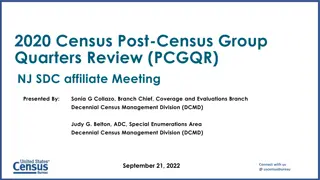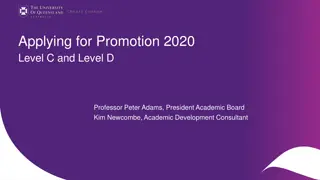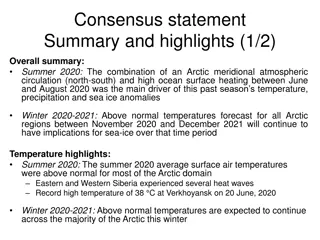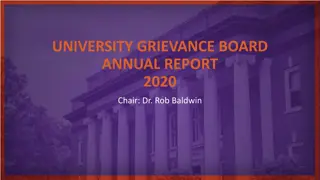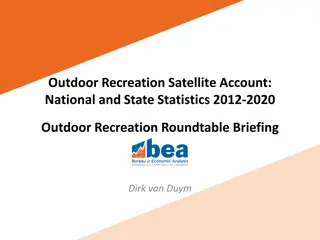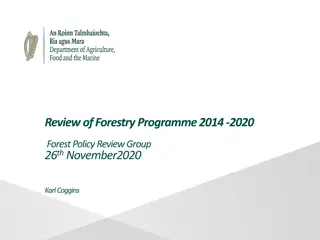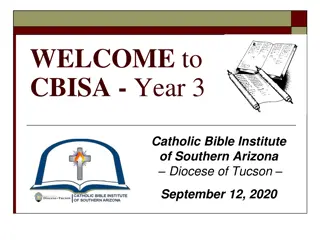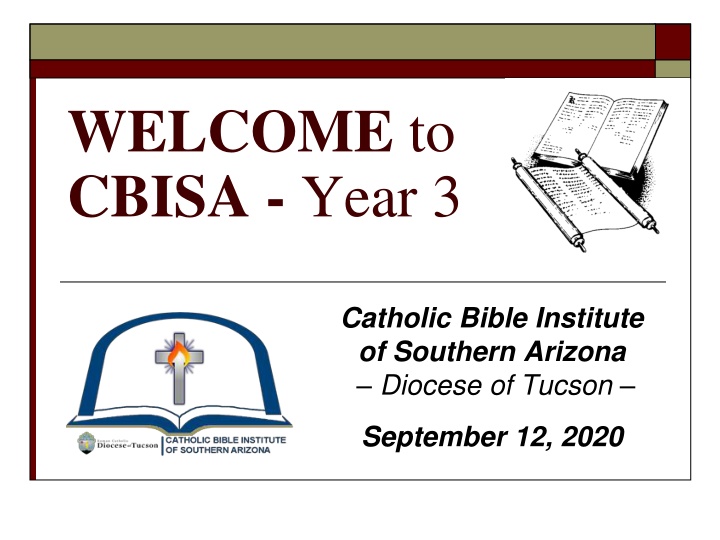
CBISA Year 3: Catholic Bible Institute Schedule & Readings
Delve into the schedule and readings of CBISA Year 3 at the Catholic Bible Institute of Southern Arizona. Join sessions on using Zoom effectively, biblical teachings, and engaging in prayer. Explore the day's program, including opening prayers, scripture readings from Joshua and Psalms, and discussions on faith formation. Engage in Lectio Divina and discovery the spiritual depth of the Word.
Download Presentation

Please find below an Image/Link to download the presentation.
The content on the website is provided AS IS for your information and personal use only. It may not be sold, licensed, or shared on other websites without obtaining consent from the author. If you encounter any issues during the download, it is possible that the publisher has removed the file from their server.
You are allowed to download the files provided on this website for personal or commercial use, subject to the condition that they are used lawfully. All files are the property of their respective owners.
The content on the website is provided AS IS for your information and personal use only. It may not be sold, licensed, or shared on other websites without obtaining consent from the author.
E N D
Presentation Transcript
WELCOME to CBISA - Year 3 Catholic Bible Institute of Southern Arizona Diocese of Tucson September 12, 2020
Welcome to CBISA Year 3! Using ZOOM Easily and Well You control: Camera, Microphone, Volume settings Speaker View vs. Gallery View Hosts control: Shared Screen (so you see my PPTs) Your Participation: Chat Box, Open Mic, Breakouts Sign in at 8:45; Say hello in Chat (attendance) Put in your real name(s) Questions?
CBISA Year 3 Todays Schedule 8:45 Sign-in to ZOOM Session 9:00 Welcome & Opening Prayer (CBISA Leadership Team) Announcements Registrations Textbooks 9:15 Presentations (Fr. Felix) (with two 10-minute breaks, starting around 10:00 and 11:00) Year 3 Overview: Purpose, Adult Faith Formation, Team Projects Catholic Approach to Bible-Study/Scripture-Sharing Groups How to Read the Bible: Various Plans; Scripture Sharing Resources Parish Structures: Personnel & Ministries & Facilities Begin Organization of Spring Team Project 12:00 Lunch Break 1:00 Lectio Divina Introduction to Lectio Divina Sample Lectio Divina Session 2:00 Evaluation & Discussion of Lectio Divina Process 2:30 Final Announcements and Closing Prayer 2:45 Conclusion
Opening Prayer: Song: Your Words Are Spirit and Life, vv. 1 & 2 Reading: Joshua 1:1-8 Responsorial: Psalm 119 Intercessions Prayer Song: Your Words Are Spirit and Life, v. 3 https://www.youtube.com/watch?v=kLtJbB0bWYs
Reading: Joshua 1:1-8 A Reading from the Book of Joshua: After Moses, the servant of the LORD, had died, the LORD said to Moses aide Joshua, son of Nun: Moses my servant is dead. So now, you and the whole people with you, prepare to cross the Jordan to the land that I will give the Israelites. Every place where you set foot I have given you, as I promised Moses. All the land of the Hittites, from the wilderness and the Lebanon east to the great river Euphrates and west to the Great Sea, will be your territory. No one can withstand you as long as you live. As I was with Moses, I will be with you: I will not leave you nor forsake you. Be strong and steadfast, so that you may give this people possession of the land I swore to their ancestors that I would give them. Only be strong and steadfast, being careful to observe the entire law which Moses my servant enjoined on you. Do not swerve from it either to the right or to the left, that you may succeed wherever you go. Do not let this book of the law depart from your lips. Recite it by day and by night, that you may carefully observe all that is written in it; then you will attain your goal; then you will succeed. The Word of the Lord. All: Thanks be to God.
Psalm 119 Refrain/All: Blessed are those whose way is blameless, who walk by the law of the Lord. Women: Blessed are those whose way is blameless / who walk by the law of the Lord. Blessed those who keep God s testimonies / who seek him with all their heart. (Ref.) Men: They do no wrong / they walk in God s ways. You have given them the command / to observe your precepts with care. (Ref.) Women: May my ways be firm / in the observance of your statutes! Then I will not be ashamed / to ponder all your commandments. (Ref.) Men: I will praise you with sincere heart / as I study your righteous judgments. I will observe your statutes / do not leave me all alone. (Ref.)
Opening Prayer: Intercessions That the Church may grow in unity and remember Christ s call to love and serve one another, including the challenge to love our enemies and to serve the poorest among us. We pray to the Lord All: Lord, hear our prayer. That all world leaders may act with honesty, integrity, and compassion to those whom Jesus loves especially the poor and alien, orphans and widows. We pray to the Lord All: Lord, hear our prayer. That God continue to bless our Catholic Bible Institute community, so that we may give witness by living in a way consistent with the faith we proclaim. We pray to the Lord All: Lord, hear our prayer. That God bless our families with stronger bonds of friendship, love, and peace. We pray to the Lord All: Lord, hear our prayer.
Opening Prayer: Conclusion Collect Prayer Leader: Merciful Lord, inspire us to read your Scriptures and to meditate upon them day and night. We beg you to give us real understanding of what we need, so that we in turn may put its precepts into practice. Yet, we know that understanding and good intentions are worthless, unless they are rooted in your graceful love. So we ask that the words of Scripture may be not just signs on a page, but also channels of grace into our heart. All: Amen. Song: Your Words Are Spirit and Life, v. 3
CBISA Year 3 Syllabus TEXTBOOKS: Mestre, Gabriel. Pray with the Bible; Meditate with the Word: The Exciting World of Lectio Divina. ABS, 2013. Regan, Jane E. Forming a Community of Faith: A Guide to Success in Adult Faith Formation Today. New London, CT: Twenty-Third Publications, 2014. WEBSITES: Diocese of Tucson https://diocesetucson.org/cbisa Overall schedule & administrative contacts Fr. Felix Just, SJ https://catholic-resources.org/CBISA Syllabus, with Handouts & PPT Presentations
CBISA Year 3 Syllabus CBISA YEAR 3 LEADERSHIP TEAM: Fr. Felix Just, SJ Sr. Lois Paha, OP Ofelia James Pam Coonan Randy Munsen FALL SESSIONS (Sept. Dec.) Mornings: Presentations by Fr. Felix Afternoons: Small-Group Practice in Lectio Divina (& other scripture-sharing methods & programs)
CBISA Year 3 Syllabus (cont.) SPRING TEAM PROJECTS (Jan. April) Facilitate a Scripture Sharing project in your own parish, school, online, or other group setting physically or virtually! Visit and evaluate at least one other Scripture Sharing project facilitated by other CBI participants. again, physically or virtually! Write a brief summary/evaluation report for your own Scripture Sharing project. See the extra handout which explains the Team Project in more detail. Saturday, May 8, 2021 Wrap-Up / Evaluation Session: Each individual submits all written summary/evaluation reports. Each team presents an oral summary of how your project went and what you learned in the process. (time & location TBD) Sunday, June 6, 2021 Certification Ceremony; 2:30 PM Liturgy of Word; Conferral of Certificates, Reception (location TBD)
Year 3 Team Projects GOAL: Learning to Facilitate Small-Group Scripture Sharing Who? - teams of three (or at least two) With Whom? - recruit participants; about 8-12 people Where? - parish, school, colleagues, neighbors, online, etc. When? - almost any time (finish before May 8, 2021) How Long? - at least six 90-min sessions (or nine 60-min sessions) What? - choose biblical readings, books, or topic How? - Select resources; select Lectio Divina or similar approach; integrate prayer, reading, reflection, study, quiet, and sharing.
Year 3 Team Projects FALL: Planning your Team Project for the Spring Sept. 2020 Form Project Teams Oct. 2020 Begin Developing Your Project Plans Nov. 2020 Develop Your Plans in More Detail Dec. 2020 Finalize Plans for Your Team s Project SPRING: Implementing your plans (Jan. April) Actually conduct/facilitate a small Scripture-Sharing group May 8, 2021 Wrap-Up / Evaluation Session Presenting your written & oral reports Sunday, June 6, 2020 Certification Ceremony Place TBD, depending on COVID
CBISA Certification Requirements for being certified by the Diocese of Tucson: On-time attendance at all five Saturday sessions (Fall 2020 & May 2021). No more than one absence can be excused, and only for an emergency or very serious reason. On-time submission of all project-related written assignments. Evidence of incorporating the CBISA feedback in revising your project plans. Successful completion of the project planned and implemented by your team. Evidence of having learned and applied the course material: not just knowledge of the structure and content of the OT and NT, but also the availability of academic and pastoral scripture-sharing resources, the principles of Catholic Biblical Interpretation, the Lectio Divina process, project planning skills, group facilitation skills, conflict resolution skills, and related topics.
How to Read the Bible? Catholic Approaches to Biblical Interpretation Felix Just, S.J., Ph.D. Jesuit Biblical Ministries, Los Angeles, CA https://catholic-resources.org
Should Catholics read the Bible? Common Warning before Vatican II DON T read the Bible! Why Not? Too dangerous! Too easy to misunderstand! Just listen to what Sister or Father tells you about it. New Emphasis since just before Vatican II: DO read the Bible, but humbly, carefully, prayerfully! How? In Liturgy & Sacraments, communally & individually
A Key Question: Should Catholics Read the Bible Literally? Do we accept the Literal Interpretation of the Bible? Answer: YES! (Are you surprised?) Distinctions: Literal but not literalistic (not naively; not as fundamentalists) Literal means according to the letter Bible is literature! Literally AND spiritually (not either/or)
What Is Fundamentalism? Five Fundamentals of Christian Doctrine (1890 s, Prot.) 1. Literal Inerrancy of the Bible (interpreted 100% factually) 2. Virgin Birth & Deity of Jesus 3. Substitutionary Atonement (Jesus death) 4. Bodily Resurrection of Jesus 5. Imminent Return of Jesus Popular Appeal of Fundamentalism: simplistic answers to complex questions meaning of texts is obvious? people crave certainty (don t want ambiguity or complexity)
5 Principles of Catholic Biblical Interp. 1. Incarnational Theology Core (God s Self-Revelation!) vs. bibliolatry, over-emphasis on Bible as text 2. Both / And Approach to Christian Theology vs. one-sided over-emphasis or neglect 3. Ecclesial Guidance for Proper Understanding vs. individualistic mis-interpretations 4. Literary Genres are Diverse/Complex vs. modernist / historicist assumptions 5. Historical-Critical Exegesis is Essential vs. fundamentalist / literalist fallacies
Principles of Catholic Interpretation (1) Incarnational Principle: God s Self-Revelation Revelation = God s self-communication in/to world In multiple stages: more and more explicit over time Tradition = passing on God s revelation to future In multiple stages: gradually more explicit and established
Principles of Catholic Interpretation (1) Incarnational Theology is the Core & Climax Word of God is not just a book (Bible), but Jesus! Jesus is the Pinnacle of God s Self-Revelation to the World God sent his only-begotten Son (John 3:16) Incarnation: The Word became Flesh (John 1:14) Jesus of Nazareth = both Son of God and Son of Mary Word of God (God speaks, things happen; cf. Gen 1) Word made Flesh (God speaks in human languages) See New Testament Christology (FJ)
Principles of Catholic Interpretation (2) The BOTH / AND Approach is Foundational: Applies to Theology in general, Scripture in particular Heads/Tails, Positive/Negative, North/South Examples from Theology: God is both transcendent and immanent Jesus is both fully human and fully divine The Eucharist is both a meal and a sacrifice Problems/Errors with One-Sided Over-emphases: Ex: Blind people touching different parts of an Elephant
Principles of Catholic Interpretation (2) The BOTH / AND Approach is Foundational: Bible is both the Word of God and authored by humans Bible contains both Old Testament and New Testament Bible is both studied academically and prayed liturgically Bible is used both individually and communally Bible has both literal and spiritual meanings (4-fold meaning) Caution: Read it literally (as literature of various types), but not literalistically (mere historical facts) See BOTH/AND: The Essential Key to Catholic Theology (FJ)
Principles of Catholic Interpretation (3) Ecclesial Guidance is Necessary Jesus, Disciples, Holy Spirit, Church: All came before the Bible was written and compiled! The Church (guided by the Holy Spirit) created the Bible, not only vice-versa! Church community helps us understand the texts: Homilies, Books, Courses, Bible Study, Scripture Sharing Groups, etc. Personal interpretation should not conflict with Church Tradition Popes and Bishops are the guarantors of the Church s Tradition (assisted by theologians & exegetes)
Official Church Documents: Pope Pius XII: Divino Afflante Spiritu (1943) Second Vatican Council: Dei Verbum (1965) Pontifical Biblical Commission: Historical Truth of the Gospels (1964) The Interpretation of the Bible in the Church (1993) Catechism of Catholic Church (1994; 2nded. 1997) In section on The Profession of Faith (par. 51-141) Pope Benedict XVI: Verbum Domini: The Word of the Lord (Post-synodal Apostolic Exhortation, 2010) [ Online versions of these and related documents - FJ]
Principles of Catholic Interpretation (4) Awareness of Literary Genres is Crucial: GENRE = category or type of literature (or art, music, etc.) characterized by a particular form, style, or content. Many publications contain multiple genres: Ex: Newspapers have news articles, editorials, comics, obituaries, sports results, financial reports, classified ads, movie reviews, etc. The Bible is not just one book, but a whole library It contains many different literary genres, not just history See An Introduction to Literary Genres & Form Criticism (FJ)
Hebrew Bible Genres Myths & Legends (Genesis, parts of Exodus, Numbers, Deuteronomy) Legal Codes (Leviticus, parts of Exodus, Numbers, Deuteronomy) Genealogies (parts of Genesis, much of Numbers) Annals (Josh, Judges, 1 & 2 Samuel, 1 & 2 Kings, etc.) Prophetic Books (Isaiah, Jeremiah, Ezekiel, etc.) Psalms/Odes/Songs (Psalms) Prayers/Laments (Lamentations) Proverbs (Proverbs) Wisdom Literature (Job, Wisdom, etc.) Apocalypse (Daniel)
New Testament Genres Gospels (Mark, Matthew, Luke, John) Acts (Acts of the Apostles) Letters (esp. Paul's) Church Orders (1 Timothy, Titus) Testament (2 Timothy & 2 Peter) Homily/Sermon (Hebrews) Wisdom Collection (James) Epistles/Encyclicals (1 & 2 Peter) Apocalypse (Revelation to John) Many more sub-genres, esp. within the Gospels
What is Truth? There are different KINDS of Truth : Historical: Pearl Harbor was bombed on Dec. 7, 1941. Conventional: My name is Felix. Scientific: The earth revolves around the sun. Mathematical: 2 + 3 = 5 Theological: God is love. All of these are true but not all are historical So, the whole Bible is true, but not all the Bible is historical!
Literary Genres - Applications Did God create the whole world in only six days? What is the literary genre of Genesis 1? Was Jonah really in the belly of a whale for 3 days? What is the literary genre of the Book of Jonah? Was Daniel really thrown into a Lion s Den? What is the literary genre of the Book of Daniel? Is the Parable of the Vineyard Workers really fair? What is the literary genre of Jesus parables?
Principles of Catholic Interpretation (5) Historical-Critical Exegesis is Essential: Ex-egesis = leading out (drawing the intended meaning out of the text) Vs. eis-egesis (putting your own pre-formed opinions into the text) Critical = asking analytical questions (not just critiquing ) Consider multiple levels of both Content and Context: Historical / Literal Content & Spiritual / Theological Content Historical Context (surrounding world) & Literary Context (surrounding text) Openness to Development (historical, literary, theological): Development from oral preaching/tradition to written texts/scriptures Growth in our understanding and application of texts over time
Principles of Catholic Interpretation (5) Results of Exegesis available to non-specialists: Study Bibles: Catholic Study Bible, New Jerusalem Bible, HarperCollins SB Bible Dictionaries: HarperCollins, Eerdmans, Anchor, Interpreter s, etc. Bible Commentaries: One-Vol: New Jerome BC, HarperCollins, Collegeville, etc. Multi-Vol: Sacra Pagina, Anchor BC, many others
Principles of Catholic Interpretation (5) Biblical Exegesis shows Theological Developments, even within the Bible itself. For example: Polytheism (there are many gods, with different roles) Henotheism (our God is better than all other gods) Monotheism (there is one and only one true God) Trinitarian Monotheism (one God is Father, Son, Spirit)
Principles of Catholic Interpretation (5) Biblical Exegesis also shows Moral Developments: Ancient Cultures: escalating retribution Strike back hard! If you kill one of us, we ll kill ten of you! Hebrew Bible: limited retribution Eye for eye, tooth for tooth, life for life ? Exod 21:23-24; Lev 24:19-20; Deut 19:21 Literal meaning? Historical context? New Testament: NO retribution! Matt 5:38-48 turn the other cheek, love your enemies Literal meaning? Modern application?
Summary / Review 1. Incarnational Theology Core (God s Self-Revelation!) vs. bibliolatry, over-emphasis on Bible as text 2. Both / And Approach to Christian Theology vs. one-sided over-emphasis or neglect 3. Ecclesial Guidance for Proper Understanding vs. individualistic mis-interpretations 4. Literary Genres are Diverse/Complex vs. modernist / historicist assumptions 5. Historical-Critical Exegesis is Essential vs. fundamentalist / literalist fallacies
How to Read the Bible? Various Reading Plans Felix Just, S.J., Ph.D. Jesuit Biblical Ministries, Los Angeles, CA https://catholic-resources.org
How Catholics USE the Bible: As the Foundation for all Theology & Ethics: Multiple Sources for Theology, not just the Scriptures Also Tradition, Experience, Culture In Liturgical Proclamation: Readings proclaimed at Eucharist & other Sacraments Selections prescribed in the Lectionary for Mass For Prayerful Meditation: By individuals and/or groups Bible Study, Lectio Divina, etc. Which texts to choose?
Plans for Choosing Biblical Texts 1. Canonical Approach In biblical order, from Genesis to Revelation 2. Christo-centric Approach Selected books, focusing on Jesus 3. Thematic / Theological Approach Selected texts, focusing on themes 4. Liturgical / Lectionary Approach Readings used at Sunday & daily Mass
1) Canonical Approach Reading the whole Bible from beginning to end: From the Book of Genesis to the Book of Revelation Reading thirty or more minutes each day Reading one or more chapters each day Various plans for reading the whole Bible: Daily Scripture and Catechism Devotional 1-year plan, by the Coming Home Network How to Read the Bible Every Day: A Guide for Catholics 1-year, 2-year, 3-year plans; by Carmen Rojas Probably not the best method, esp. not for beginners Old Testament (OT) is long and difficult; you might give up!
2) Christo-centric Approach Reading one book at a time, focusing on Jesus: Begin with one of the Gospels, for the basic story about Jesus. Maybe start with Mark, the oldest & shortest Gospel. Then read some NT letters, another Gospel, and Acts of the Apostles. Then read more NT letters and also some OT books. Read OT or NT books acc. to the Lectionary schedule. Many good commentaries to guide your study: Collegeville Bible Commentary and New Collegeville Bible Commentary series by The Liturgical Press. Little Rock Scripture Study by the Diocese of Little Rock, Arkansas, and The Liturgical Press. Six Weeks with the Bible: Catholic Perspectives by Loyola Press. Denver Catholic Biblical School Program by Paulist Press.
3) Thematic/Theological Approach Reading portions of the Bible that are related to some theological, ethical, spiritual, liturgical, or other theme. For example, read texts related to the resurrection of Jesus or texts related to an issue of social justice or texts related to Mary or one of the saints. Booklets and guides on various biblical themes: Threshold Bible Study thematic studies presented in short workbooks; from Twenty-third Publications. Scripture from Scratch short flyers appropriate as bulletin inserts; from St. Anthony Messenger Press. Interfaces a new series of short commentaries on certain biblical characters; from The Liturgical Press.
4) Liturgical/Lectionary Approach Reading the short biblical selections that are used for daily and/or Sunday Mass, as found in the Lectionary. Monthly booklets of liturgical readings, along with commentaries, prayers, and/or study aides: Give Us This Day; Living with Christ; Magnificat; The Word Among Us; etc. Readings for Mass on the US Catholic Bishops website: https://bible.usccb.org/ See also the Lectionary for Mass section of my website: https://catholic-resources.org/Lectionary.
Bible Study Resources See HO on Threshold Bible Study (Stephen Binz) & Six Weeks with the Bible (Loyola Press) More details on resources next month
Which English Translation to Use? Many choices possible, none is best Newest ones (1980 s or later) are generally better Avoid older ones: King James Version or Douay-Rheims Good to use & compare several different translations More literal : New American Bible (NAB), NRSV, etc. More colloquial : New Jerusalem Bible (NJB), REB, etc. Catholic or Ecumenical Editions With the Apocrypha or Deuterocanonical Books Study Bible Editions With introductions, footnotes, maps, etc.
How Well Do You Know Your Parish? Personnel: Pastor / Administrator / PLD; Associate Pastors / Pastoral Associates Ministry Staff: DRE, AFF, Liturgy/Music, Social Service, etc. Support Staff: Business Manager, Receptionist, Maintenance, etc. Parish Volunteers: Parish Council, Catechists, Liturgical Ministers, etc. Parish School(?): staff, children, stability, facilities, parish interface Active Parishioners: # registered, attendees (weekly, annual), visitors Social Description: age range, ethnic makeup, economic levels, etc.
How Well Do You Know Your Parish? Ministries: Liturgy: Sundays & Weekdays Sacraments & Sacramental Preparation Religious Education for Children Adult Faith Formation (RCIA, more?) Social Groups; Service Outreach/Projects Other? Facilities: Church, Hall, Classrooms, Meeting Rooms Restrooms, Keys, Lights, Heater/AC, Audio-Visual, Parking Kitchen, Storage Rooms, Tables, Chairs, etc.
Event/Activity Logistics Planning: Think of all the basics: Who, what, where, when, how, why? Permissions & scheduling: avoid major conflicts/overlaps Teamwork, Collaboration, Partnership, Community! Communication, Communication, Communication! Publicity: Bulletin, flyers, pulpit announcements Work with/through existing groups Personal invitation is always best
Event/Activity Logistics Set-up: Furniture: type & arrangement (seats? tables? community atmosphere?) Refreshments (warm and/or cold, liquid and/or solid? before, during, after?) Sacred Space (separate or integrated? candles? icons/images/symbols?) Resource Table (books, pamphlets, flyers; free, to borrow, for sale?) Program: Stick to your schedule! Stick to your topic! But also: Be flexible! Be adaptable! Roles of facilitators & participants
Getting to Know the Lectionary How well do you know the structure of the liturgical year and the Lectionary/scripture readings? Official Introduction to the Lectionary (2ndedition, 1981): Chap. 5 explains rationale for reading selections for each liturgical season Available online at http://catholic-resources.org/Lectionary Overall Structure of the Lectionary (USA edition, 1998/2002): Vol. 1: Sundays (and major feasts, arranged by liturgical season) Vols. 2-3: Weekdays (Years I & II) and Sanctoral cycle (propers) Vol. 4: Commons, Rituals, Votives, Various Needs and Occasions Biblical Resources: Study Bibles, Commentaries, Dictionaries, Atlases, Concordances, etc. Lectionary-based guides, seasonal reflections, preaching aides, etc. More on all this at our November session.

